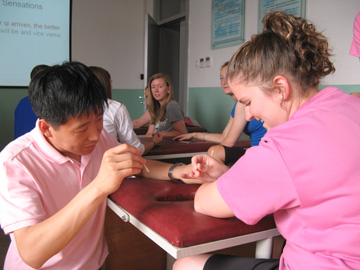Health and kinesiology professor forges study abroad link in China

Bai Zhengming, an instructor at Beijing Sport University in China, teaches Lauren Vincent, a Purdue student in athletic training, about traditional Chinese acupuncture. Vincent traveled to China in 2010 as part of a study abroad program in Purdue's department of health and kinesiology. (photo provided)
In 2006, Larry Leverenz was searching for a way to translate his love of international travel and cultures into a viable study abroad program for health and kinesiology students.
That spring, Leverenz, clinical professor of health and kinesiology, found just the opportunity he sought. While traveling in China as part of the University's Global Partners program, Leverenz inked a deal with Beijing Sport University. It sees Leverenz take athletic training students every other year to Beijing for three weeks to learn about traditional Chinese medicine, to study Chinese training methods and to make connections with their Chinese counterparts.
This May, Leverenz -- who also is Purdue's director of athletic training education and interim head of the health and kinesiology department -- will take 24 students to Beijing Sport University. That's 10 more than when the program first began in 2007.
Leverenz represents one of Purdue's biggest success stories when it comes to creating a vibrant, sustainable study abroad program, says Michael A. Brzezinski, dean of international programs.
"Some might consider athletic training a major that's not conducive to having a study abroad program, but just look at what can happen if you find the right partner and are willing to pursue making the program sustainable," Brzezinski says.
"If other departments learn from Dr. Leverenz's example, we'd vastly increase the number of Purdue students who study abroad. We need more sustainable programs like Larry's -- programs that become a part of a department's culture. When you have students asking if a program will be offered and if there will be room for 'me,' then you know that it is a welcomed winner. When students demand it, you know that the program has arrived."
This summer, the Office of International Programs' Global Partners program will take a group of 18 faculty and staff members to the Chinese cities of Beijing and Shanghai to help them catch visions for creating new study abroad programs -- just as Leverenz did six years ago. They also will conduct pre-departure orientation programs for Chinese students who will matriculate as freshmen at Purdue this August.
Also, faculty and staff with fleshed-out study abroad ideas can apply for Study Abroad and International Learning (SAIL) grants. Between 20 and 25 of those grants, worth $7,000 each, are given each year to help new study abroad opportunities get off the ground. The deadline to apply is typically mid-September.
For his part, Leverenz says he suspects that his department's study abroad program has become popular because previous participants have so enjoyed spending time immersed in the Chinese culture.
In addition to learning at Beijing Sport University and putting on an athletic training workshop for Chinese students, Leverenz's students typically travel to two other Chinese cities during the course of the program.
The program also has spawned a similar one in the same department. It sees Darlene Sedlock, associate professor of exercise physiology, take her students to the same Beijing university every other year, on the off year of Leverenz's program.
Athletic training students who have participated in Leverenz's study abroad opportunity say doing so was one of the most worthwhile experiences of their lives.
"Sometimes, we really get used to the routine of how we do things here," says Lauren Vincent, a senior in athletic training who participated in the study abroad program in 2010. "To take a step back and to look at their perspective on how injuries occur and how to take care of them -- and just their holistic philosophy -- was really different and eye-opening.
